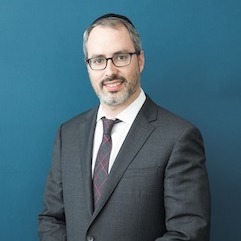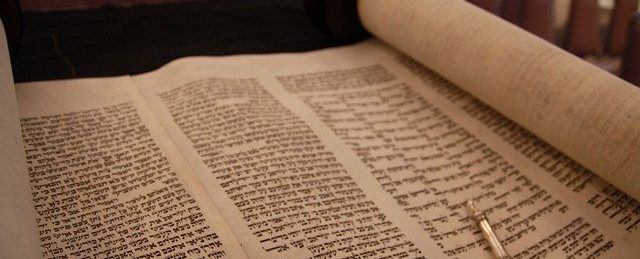There is an obligation to make a blessing before learning Torah – Birchas HaTorah. What is the nature of this beracha?
The Gemara (Berachos 21a) derives from the verse כי שם ה’ אקרא הבו גודל לאלקנו that there is an obligation to make a beracha on the Torah. Rashi explains: When Moshe approached the Jewish people to say Shira (Haazinu) he said ‘I am going to make a blessing, and you, by answering Amen will bring greatness to Hashem’.
It would seem that this Mitzvah is Biblical in nature. However the Rambam omits it from his count of mitzvos. Indeed the Ramban, who adds to the count, adds the mitzvah to say Birchas haTorah. The Megillas Esther explains the Rambam’s omission; the Rambam was of the opinion that it was only a supporting text (asmachta) not a Biblical commandment.
The Kiryas Sefer understands that the Rambam did believe it to be a biblically mandated blessing; however the blessing is included in the general obligation to study Torah and is not a mitzvah unto itself.
Rav Shach explains the position of the Rambam differently. Indeed there is no biblical obligation to make a blessing. From the verse we see that Moshe made a blessing, and indeed we learn from there that one may make a blessing, and it will not be considered using God’s name in vain. However there is no obligation to make a blessing!
What sort of beracha is Birchas HaTorah? We know there are several categories of blessings.
1)Birchas hamitzvos, blessings made prior to the performance of a mitzvah
2)Birchas hanehnin, blessings made prior to partaking in something enjoyable.
3)birchas hoda’ah – blessings of thanks, and closely related –
4)Birchas hashvach – blessings of praise
At first glance it would seem that Birchas HaTorah are Birchas Hamitzvah, a blessing made before the performance of a mitzvah.
The Brisker Rav, spurred by several questions regarding the allowance of woman to make Birchas HaTorah, quotes his father Rav Chaim Soloveitchik “the blessing is not a blessing on the mitzvah of learning Torah, rather the Torah itself necessitates a blessing”. This sounds like a birchas Hanehnin, a blessing made on something enjoyable such as food. Indeed it is said in the name if Rav Chaim that the blessing on Torah is a birchas hanehnin.
This has a practical dimension. Rav Chaim ruled that if a baal koreh has stopped reading conclusively, and then decided to go a bit further, the oleh is required to make a new blessing, akin to one who decides to stop eating and then changes his mind!
Some more questions. Why are there two blessings, one before and one after, when called for an aliyah, and when it comes to birchas HaTorah we say only the ‘before’ blessing? Furthermore, why do we make two blessings in the morning?
The Levush suggests, along the lines of Rav Chaim, that when one is called to the Torah there is a before and an after, much like when eating there is a before and an after. There is therefore a blessing before and after. However when referring to our own personal obligation to learn and toil in Torah there is a before, when we wake up, but there is no stopping point! It is a pursuit that must accompany us until the moment we fall asleep. Therefore when we wake up we begin with the concluding blessing of the day before, and then make the preliminary blessing for the new day.
There is a thought from Rav Soloveitchik that can help us understand this. Rav Soloveitchik explains why after one has interrupted their learning, gone to work, or otherwise occupied himself, they do not have to make a new beracha. After all it should be considered a hefesk? Indeed Rabbeinu Tam asks this question, and explains that Torah is a full time pursuit, and one must immerse themselves in Torah day and night.
But what if you are, as we all are, mafsik? Explains Rav Soloveitchik, the obligation of Torah study is one that is always with us. We never leave it, and we are never mafsik. Rather as we go about our worldly tasks it moves to a quiet corner of our minds, but it’s always there.
He compares this to a mother who drops their child off at school and then goes about her day. Does she, for a moment, forget her child? So too with Torah study, it must be a part of us, constantly on our minds.
Rav Yosef Halavan, a commentary on the Levush questions the Levush. How can we make a concluding blessing after interrupting our learning with a significant amount of sleep? In the food parallel that would be a hefsek and the food would already be digested and it would be too late!
Retorts the Levush – firstly he would be considered an ones, unable to make the berachah because he was overtaken by sleep. Secondly, when it comes to food once it’s digested there is no trace or remembrance of the food and we can no longer offer thanks for it. However when talking about Torah it is never digested, as long as one remembers what they learnt it is considered ‘in their stomach’!
The language of the blessing is beautiful in this context. We thank Hashem for giving us the opportunity to toil in Torah. And then ask Him to be ‘mearev’ the Torah within us. We are asking Hashem to help us integrate the Torah we have already learnt into our lives, make it sweet for us and be able to hold onto the Torah of the day before. We then continue with the second beracha and thank Hashem for choosing us from all the nations and giving us the Torah.
Rav Yosef Halavan, because of his questions, offers a different approach. Both are preliminary blessings, one a birchas hamitzvah and one a birchas hanehnin, similar to matzo on Pesach. The Levush responds to this – by matzo the enjoyment and the mitzvah are two distinct things, the enjoyment would be all year, and the mitzvah is specific to Pesach night. However when it comes to Torah the mitzvah is to learn and understand and know what one is learning and that itself is the enjoyment!


Shkoyach for some beautiful insights into Birchas HaTorah.
May I share with you a short insight I heard from a great Rav here in South Africa who was a talmid of the Chofetz Chaim zt”l? His name was Rav Yermiya Aloy zt”l.
He said he heard the Chofetz Chaim once ask, why do we say the Brocha of “asher natan lanu Torat Emet” after we read from the Torah? Surely we should say it before – because there is no greater praise than the fact that is True?
The Chofetz Chaim answered it by giving analogy of opening a gift. He said, first you thank the Giver for His generosity (Asher bachar banu mikol ha’amim venatan lanu et Torato), then you open the gift and inspect it and afterwards you praise the gift (asher natan lanu Torat Emet).
I love that idea and I think of it every time I get an aliya in Shul.
Thanks again.
Gabi.
Yasher koyach – Beautiful!